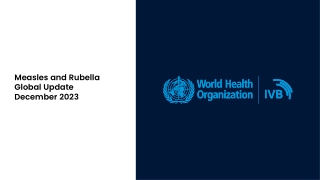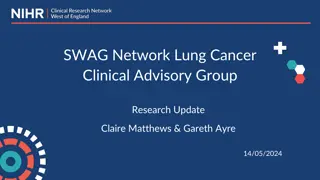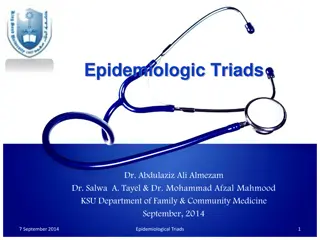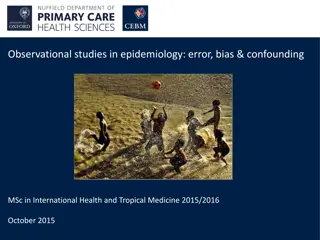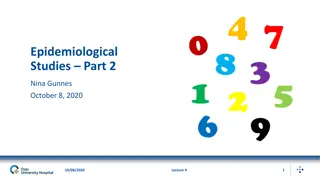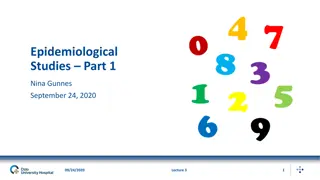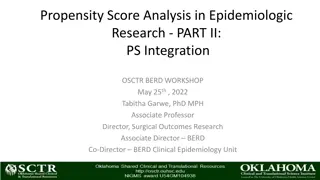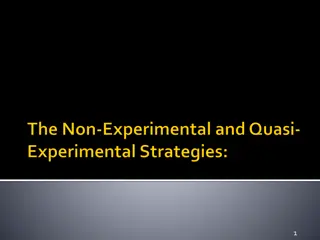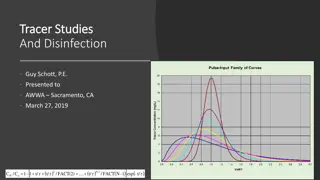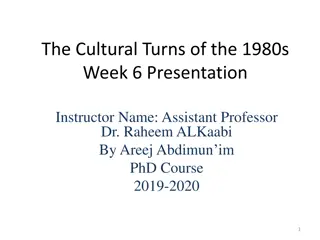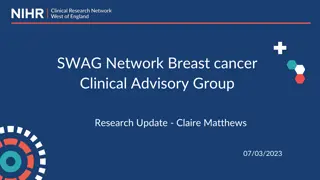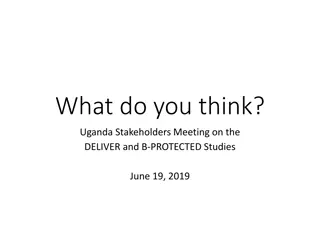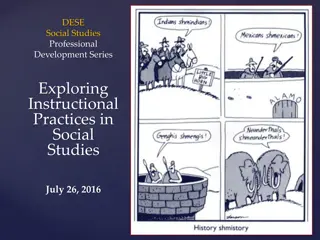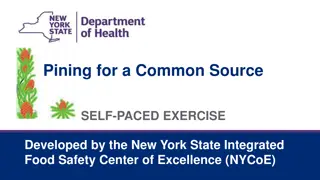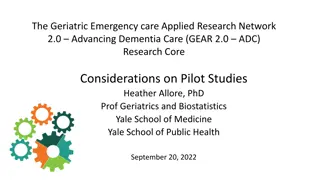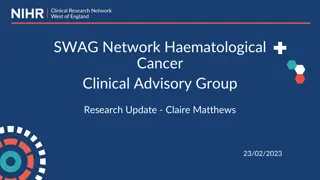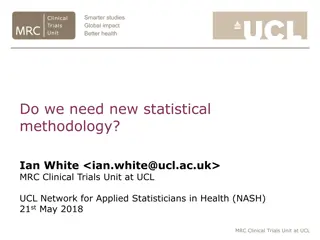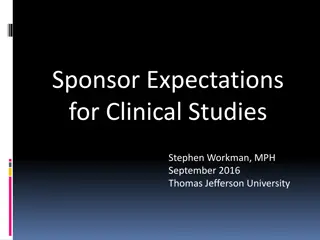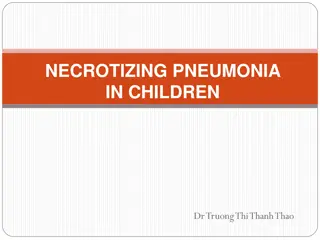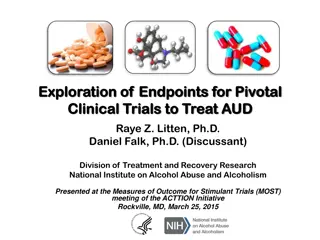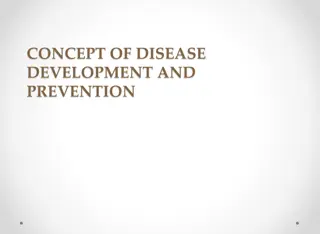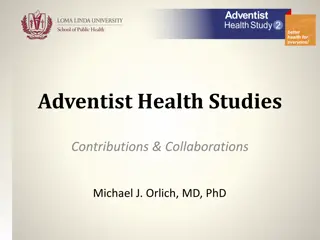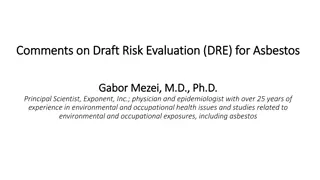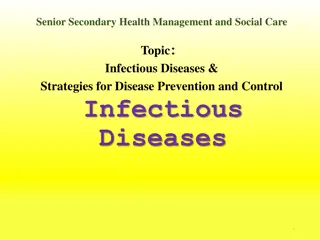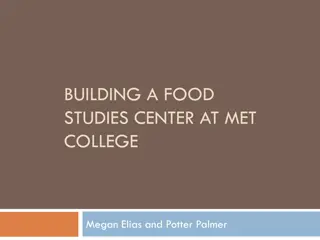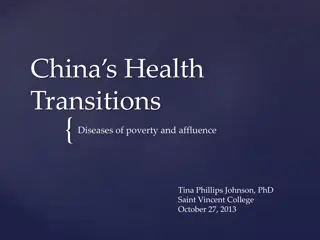Measles and Rubella Global Update December 2023
Stay informed with the latest data on measles and rubella cases worldwide with this report. Surveillance data, epidemiologic data, and laboratory reports are analyzed and updated monthly. For accurate and up-to-date information on the global status of measles and rubella, access this report. To rece
8 views • 63 slides
Global Measles and Rubella Update - April 2024
The Global Measles and Rubella Report provides provisional data on the reported cases of measles and rubella, distributed monthly via email. Official numbers are available in July each year through the WHO/UNICEF annual data collection. The report is based on surveillance data from Member States, wi
7 views • 62 slides
Remarkable Opportunities in Higher studies after Civil Engineering
Higher studies after Civil Engineering in Tamil Nadu\nCivil engineering stands at the forefront of shaping our physical environment; from the infrastructure we rely on daily to the sustainable development of our cities. Further, pursuing Higher studies after Civil Engineering opens up countless oppo
0 views • 2 slides
Latest Research and Studies on Lung Cancer - Update May 2024
This research update includes information on national recruitment to lung cancer studies, comparison of national vs. regional recruitment, and detailed descriptions of various studies and trials related to lung cancer. The studies cover areas such as treatment advancements, observational studies, ma
2 views • 13 slides
Understanding Epidemiologic Triads in Disease Causation
Epidemiologic triads are essential models for studying disease causation, with a focus on descriptive and analytical epidemiology. By exploring factors such as person, place, time, agent, host, and environment, researchers can identify key relationships in the spread and prevention of diseases. The
2 views • 24 slides
Understanding Observational Studies in Epidemiology
Delve into the realm of observational studies in epidemiology, exploring concepts such as error, bias, and confounding. Discover the significance of various study designs, from case reports to prospective cohort studies, in elucidating associations and establishing causality in non-communicable dise
0 views • 58 slides
Overview of Cohort Studies in Epidemiology
Cohort studies are a type of observational study where a group of healthy subjects is followed over time to investigate relationships between exposures and outcomes. They provide valuable insights into disease development and risk factors, offering advantages like assessing multiple exposures and en
0 views • 21 slides
Overview of Ecological Studies in Epidemiology
Ecological studies in epidemiology involve studying groups of individuals at a population level to examine the correlation between exposure and disease occurrence. While cost-effective and useful for generating hypotheses, ecological studies have limitations, such as the inability to control for con
3 views • 21 slides
Integration Approaches of Propensity Scores in Epidemiologic Research
Propensity scores play a crucial role in epidemiologic research by helping address confounding variables. They can be integrated into analysis in various ways, such as through regression adjustment, stratification, matching, and inverse probability of treatment weights. Each integration approach has
0 views • 20 slides
BSc in Strategic Studies & International Relations at KDU
The Faculty of Defence and Strategic Studies at KDU offers a hybrid BSc degree in Strategic Studies and International Relations to prepare skilled professionals in national security and foreign relations. The program aims to develop theoretical and research skills for analyzing international politic
0 views • 8 slides
Overview of Media Studies Disciplines and Historical Development
Media studies is a multidisciplinary field that explores the content, history, and effects of various media, with roots in the relationship between media and culture. Originating in the 1920s, media studies draws on traditions from social sciences and humanities, incorporating theories from discipli
5 views • 18 slides
Understanding Post-Authorisation Safety Studies (PASS) in Pharmacovigilance
Post-Authorisation Safety Studies (PASS) are conducted after a medicinal product is authorized to gather more safety information or assess risk management effectiveness. These studies evaluate the safety and benefit-risk profile of the product, aiding regulatory decision-making. PASS aims to identif
0 views • 4 slides
Understanding Nonexperimental and Quasi-experimental Studies
Nonexperimental and quasi-experimental studies resemble experiments but lack random assignment, making them valuable for group comparisons without establishing causation. This type of research design looks at differences between groups that already exist, focusing on group differences rather than ca
1 views • 35 slides
Understanding Tracer Studies and Disinfection in Water Treatment
Tracer studies play a crucial role in determining hydraulic efficiencies and disinfectant exposure times in water treatment processes. This presentation by Guy Schott covers the purpose of tracer studies, water age distribution, disinfection exposure time, CT disinfection, log inactivation, and more
0 views • 34 slides
The Cultural Turns of the 1980s in Translation Studies
This presentation explores the various cultural turns in Translation Studies during the 1980s, highlighting key scholars such as Snell-Hornby and Even-Zohar. It discusses the linguistic turn, pragmatic turn, and the significance of cultural studies in understanding translation processes, particularl
0 views • 30 slides
Understanding Clinical Trials: Types and Designs
Clinical trials are essential research studies that evaluate new tests and treatments to improve human health outcomes. They involve various phases, designs, and purposes, such as treatment trials, prevention trials, and observational studies. Different types of clinical trial designs include experi
7 views • 18 slides
Epi-Ready: Investigating Foodborne Outbreaks & Epidemiologic Approaches
In Module 6 of the Epi-Ready Epidemiologic Investigation series, participants learn about epidemiologic approaches in responding to foodborne outbreaks. The module covers methods for information gathering, measures of association, statistical significance, case definitions, surveillance activities,
1 views • 41 slides
Breast Cancer Research Updates and Recruitment Data Overview
This document provides updates on breast cancer research, focusing on recruitment data and studies conducted between 2019 and 2023. It includes information on national and regional recruitment to breast cancer studies, SWAG region lead network studies, and opened breast cancer studies in 2022/2023.
0 views • 13 slides
Uganda Stakeholders Meeting on DELIVER and B-PROTECTED Studies - June 19, 2019
Stakeholders in Uganda convened on June 19, 2019, to discuss the DELIVER and B-PROTECTED studies evaluating PrEP and the dapivirine ring in pregnant and breastfeeding women. The discussions included concerns about community involvement, reasons why women may hesitate to join the studies, and the enr
0 views • 9 slides
Exploring Social Studies Instructional Practices: Professional Development Series
Join the DESE Social Studies Professional Development Series to delve into instructional practices in social studies. Connect with educators, explore pedagogy, and engage in hands-on activities like the Elephant and Giraffe exercise. Learn from ELA directors, Missouri Writing Project experts, and Ar
0 views • 14 slides
Foodborne Illness Outbreak Investigation Procedures and Protocols
In this self-paced exercise developed by the New York State Integrated Food Safety Center of Excellence, learners will delve into the intricacies of investigating foodborne illness outbreaks. The course covers topics such as identifying outbreak patterns, roles in outbreak investigations, interpreti
0 views • 171 slides
Pilot Studies in Advancing Dementia Care: Core Considerations
Pilot studies play a crucial role in exploring interventions, determining necessary modifications, assessing feasibility, and confirming stakeholder acceptance. They help in testing study protocols, assessing data collection procedures, and evaluating outcome measures. Feasibility studies are essent
0 views • 9 slides
Hematological Cancer Clinical Studies Update and Recruitment Statistics
Latest update on hematological cancer clinical studies from the SWAG.Network Haematological Cancer Clinical Advisory Group, including national recruitment data, regional recruitment comparisons, open studies, and sample size information for ongoing studies. This comprehensive update covers a range o
0 views • 14 slides
Choosing Between Observational Study and Experiment in Research
Observational studies involve recording data without interfering with subjects, while experiments impose treatments on subjects to establish cause and effect. A well-controlled experiment is crucial for determining causation, while observational studies can provide quick results at lower costs. Each
0 views • 24 slides
The Need for New Statistical Methodology in Health Studies
The discussion centers around the necessity for advancements in statistical methodology, particularly in trials, observational studies, and meta-analysis. The role of statisticians in interpreting data, designing studies, and addressing missing data is highlighted. The importance of understanding ex
0 views • 19 slides
Advances in Baryon Spectroscopy and Hadronic Matter Studies
Discussions at the meeting focused on interpreting HADES results for e+e- and meson production in hadronic reactions, with studies involving proton, pion, light, and heavy ion beams. The role of time-like electromagnetic transitions, baryon spectroscopy, and connecting hadronic matter studies were e
0 views • 12 slides
Recent Updates and Achievements in International Affairs and Studies
In April 2014, significant developments occurred in international affairs and studies, including visits to American University in Dubai, student mobility programs with Universiti Malaysia Pahang, and enrollment increases for Fall 2014. The Office of Graduate Studies also saw improvements in technica
0 views • 9 slides
Sponsor Expectations for Clinical Studies at Thomas Jefferson University
This presentation discusses the sponsor expectations for clinical studies, investigator responsibilities, TJU's strengths in conducting studies, and how principal investigators can impress sponsors. Topics include assessment of investigator performance, regulatory guidelines, streamlining processes,
0 views • 11 slides
Overview of Necrotizing Pneumonia in Children
Necrotizing pneumonia in children is characterized by necrosis of pulmonary tissue, leading to the formation of small cavities containing necrotic debris or fluid. Staphylococcus Aureus and Streptococcus Pneumoniae are common pathogens. Treatment involves a prolonged course of IV antibiotics tailore
0 views • 34 slides
Exploration of Endpoints in Clinical Trials for Alcohol Use Disorder
This presentation discusses the exploration of endpoints in pivotal clinical trials to treat Alcohol Use Disorder (AUD), focusing on Primary Alcohol Drinking Endpoints like PSNHDD. Evidence supporting PSNHDD as a primary endpoint includes clinical benefit data from alcohol clinical trials and epidem
0 views • 54 slides
Understanding Targeted Clinical Investigation in Pharmacovigilance
Targeted clinical investigation plays a crucial role in pharmacovigilance by further evaluating significant risks identified in pre-approval clinical trials. This involves conducting pharmacokinetic and pharmacodynamic studies, genetic testing, interaction studies, and large simplified trials to ass
0 views • 12 slides
Concentration and Minor Requirements for Bachelor of General Studies (BGS)
Bachelor of General Studies (BGS) students at Northwestern State University of Louisiana must complete a concentration consisting of 36 hours, with a minimum of 12 hours at the 3000 and 4000 levels taken at NSU. The popular concentrations are Social Science, Computer & Natural Science, and Arts & Co
0 views • 9 slides
Understanding Disease Development and Prevention
Explore the theories of disease development, the concept of the iceberg phenomenon, and the significance of prevention, control, elimination, and eradication in managing diseases. Learn about historical and modern theories, including the germ theory, epidemiologic triad, and the web causation model.
0 views • 21 slides
Exploring Pesticide Monitoring and Contamination Studies in Maine
Mary Tomlinson's work with the Maine Board of Pesticides Control includes past studies on groundwater and surface water monitoring, ongoing monitoring initiatives, and future collaborative studies. The State Law mandates residue surveys to identify possible contamination sources and develop a pestic
1 views • 55 slides
Adventist Health Studies Contributions & Collaborations Overview
Adventist Health Studies have made significant contributions to understanding the health and longevity advantages of Seventh-day Adventists, particularly focusing on vegetarian diets and cardiovascular health. With a history spanning over 57 years and various cohort studies, these studies have provi
0 views • 12 slides
Comments on Draft Risk Evaluation for Asbestos by Gabor Mezei, M.D., Ph.D.
Gabor Mezei, M.D., Ph.D., a Principal Scientist at Exponent, Inc., provides insightful comments on the Draft Risk Evaluation (DRE) for asbestos. He highlights the occurrence of mesothelioma in the absence of asbestos and challenges the assumption of increased risk in users of AABL. Mezei references
0 views • 8 slides
Understanding Infectious Diseases and Prevention Strategies
Infectious diseases are caused by pathogens like bacteria, viruses, parasites, or fungi invading the body. These diseases can spread from person to person and sometimes from animals to humans. Common characteristics include potential severe outcomes, transmission modes, and the role of pathogens. Th
0 views • 27 slides
Building a Food Studies Center at Met College
Establishing a Food Studies Center at Met College, driven by the merging of Food and Wine courses with Gastronomy programs, aims to integrate hands-on and academic approaches to food studies. Drawing inspiration from existing models like the Culinaria Research Centre and the Center for Regional Agri
2 views • 8 slides
Understanding Veteran Homelessness: Statistics and Health Risks
Explore the epidemiologic characteristics, health concerns, and outcomes of homeless veterans, along with national and state-specific numbers. Discover the challenges faced by homeless veterans and the efforts being made to combat veteran homelessness.
0 views • 29 slides
China's Health Transitions: Diseases of Poverty and Affluence
China's health transitions encompass changes in medicine and population health, influenced by factors like demographic shifts, disease patterns, and societal determinants. Challenges with data accuracy and the country's 20th-century demographic evolution are highlighted, including issues related to
0 views • 15 slides
